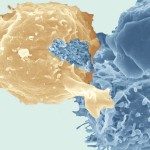Aurore Vidy-Roche is an university lecturer since 2014. She is teaching virology in University Paris Diderot and is also working in the research unit « Epidémiologie et Physiopathologie des Virus Oncogènes », managed by Pr. Antoine Gessain in Pasteur Institute, Paris.
After obtaining an engineering degree from « Ecole Polytechnique » (2002), Palaiseau, Paris, then a Master degree in Fundamental Virology (2003) in University Paris Diderot, she undertook doctoral research in Virology in the Laboratory « Virologie Moléculaire et Structurale », CNRS Gif sur Yvette, France, where she studied different functions of Rabies Virus phosphoprotein, especially concerning viral resistance to innate immunity. This work was supervised by Dr. Danielle Blondel.
After completing her PhD, she spent 4 years as post-doctoral fellow in Pr. Koszinowski research group, Munich, Germany, where she developed a genetic approach that allowed her to identify specific cell types infected by murine gammaherpesvirus-68 in vivo and follow the dissemination of their viral progeny. Then she spent 2 years as post-doctoral fellow in the laboratory « Virologie et Immunologie Moléculaires » directed by Bernard Delmas, Institut National pour la Recherche Agronomique, Jouy-en-Josas, France, to study the influence of neutrophils and of viral protein PB1-F2 on Influenza A infection derived pathogenicity.
Research project
HTLV-1 transmission through breastfeeding is the major route of transmission for this virus in the areas of highest prevalence (Africa, South America…), however its mechanisms have so far not been extensively investigated.
This transmission is mediated by infected cells present in breast milk from seropositive mothers. The crossing of an epithelium (tonsil or intestine) is then necessary to infect the infant. Previous studies realised in the lab have shown, using an in vitro model of intestinal epithelium (using Caco2 cells), that HTLV-1 virus is able to cross this epithelium by transcytosis or by transmigration of infected lymphocytes.
Our objective is to develop in vivo (mouse, rabbit) and ex vivo models (intestinal explants or loops) in order to caracterize the early steps of HTLV-1 transmission through breastfeeding. We are also studying the impact of different maternal factors (breast milk, length of breastfeeding, viral load…) and of infant intestine physiology (cellular factors, commensal microbiota) on the crossing efficiency of HTLV-1 virus through intestinal mucosa.

